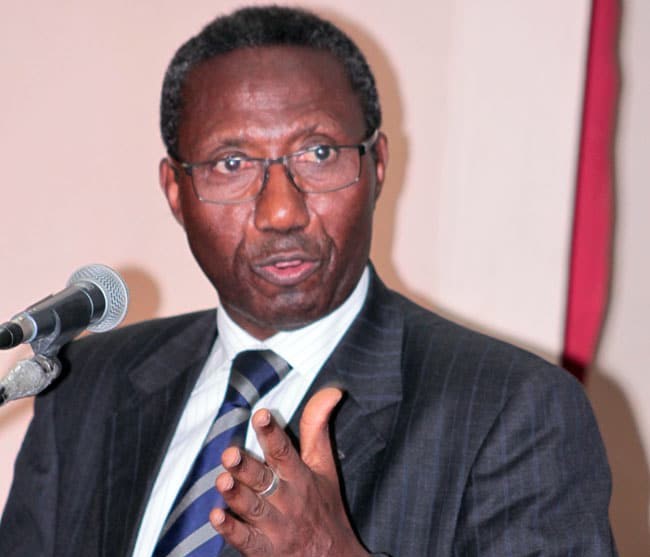Lawyer Doudou Ndoye on Amnesty Law: «The Interpretative Law does not exist»

According to Lawyer Doudou Ndoye, the interpretative law of the amnesty law does not exist in judicial language. He does not see its purpose and expresses his hope that the parliamentary opposition’s appeal to the Constitutional Council to challenge the law will succeed.
The interpretative law of the amnesty law has no reason to exist, according to Lawyer Doudou Ndoye. When asked to give his opinion on this new legislative text, which was adopted at the beginning of April and initiated by MP Amadou Bâ, this does not exist in judicial language, the lawyer stated.
« I would like a law professor, a lawyer, a magistrate from France, Ivory Coast, Congo, Benin, or Senegal to tell me if they have ever seen a law that says: ‘I am here to interpret my previous law.’ So, we are facing a new legal denial in Senegal. Someone who creates a new legal system for us, who brings this to us and who says: ‘I am going to vote on an interpretative law,' » declared Doudou Ndoye on « Le Grand Jury » which aired yesterday on Rfm.
American Madness: Trump, Elon Musk, and the future of American Oligarchy
Mr. Ndoye also expressed his hope that the appeal filed by the parliamentary opposition at the Constitutional Council will be successful.
« I cannot claim that the Constitutional Council will declare itself incompetent. Anyone who thinks so, is thinking, we can just think. The Constitutional Council will judge and decide what will happen, » the lawyer maintains.
Doudou Ndoye also expressed his disagreement with President Bassirou Diomaye Faye. This follows the Head of State’s comments that the people have the right to put pressure on the judiciary.
Mr. Ndoye considers the idea of replacing the Constitutional Council with a Constitutional Court to be « unthinkable. »
A great and worthy servant has left us
« The word ‘Constitutional Court,’ the term ‘Constitutional Court,’ is of no interest. What is of interest is the mission, not the name. The name is of no interest. What we have to do, what the members of the Constitutional Council have to do for the good of Senegal, that is what is important, » argued Mr. Ndoye.
The latter is not in favour of the President of the Republic continuing to sit on the High Council of the Judiciary. « If I had a choice to make, I would say that the Head of State would not be a member of the High Council of the Judiciary. » This is the clear opinion of Doudou Ndoye on the question of the organization and composition of the High Council of the Judiciary (CSM). However, the lawyer still wants to clarify that the Head of State will have a say in the decisions of the CSM.
[themoneytizer id= »124208-2″]
« Any decision by the High Council of the Judiciary will be submitted to him so that he can review and approve it before it is implemented, » Mr. Ndoye noted. He spoke of this nuance, which he believes aims to preserve the balance between judicial independence and institutional authority, while laying the groundwork for a more ambitious overhaul of the presidential office. « I want a true head of state at the head of Senegal, » he stated, emphasizing the need for strong structural reforms.
Mr. Ndoye categorically rejected the possibility of opening the High Council of the Judiciary to other components of society. « No. Absolutely not! » he replied curtly. The High Council of the Judiciary is a specialized institution that must remain in the hands of those who understand its intricacies. « The magistrate is the magistrate. The magistrate is a firm body, a body that must be respected, » he argued, before adding that the High Council of the Judiciary is designed exclusively for magistrates.
[themoneytizer id= »124208-19″]
« The High Council of the Judiciary, which oversees the careers of magistrates, can only be composed of magistrates, just as the National Assembly can only be composed of MPs, » Mr. Ndoye argued.
Independence of the Justice
The lawyer rekindled the debate on the independence of the judiciary and the role of the President of the Republic in judicial governance at a time when public expectations for institutional reform are increasingly pressing.
Mr. Doudou Ndoye also expressed his sincere condolences to Mr. Koureychi Bâ and Mr. Mamadou Badio Camara, President of the Constitutional Council, who have recently passed away. He paid them a glowing tribute for their service to the Senegalese justice system.
By Amadou MBODJI / ambodji@lequotidien.sn

